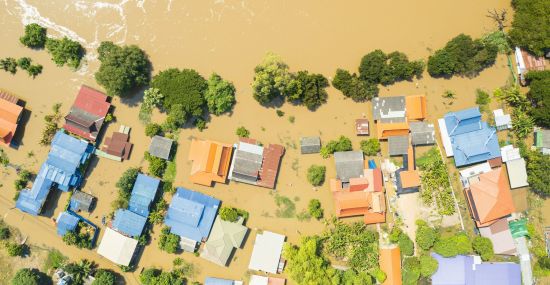Examining the effects of climate change and extreme weather on HIV
Harrison Tasoff | October 23, 2023

Photo Credit
CUNY SPH
Houses submerged after a flood in Thailand
Two new grants from the National Institute of Allergies and Infectious Diseases will support innovative research to advance the understanding of how climate change and extreme weather influence HIV-related health outcomes around the world.
A multidisciplinary team of researchers at the CUNY Graduate School of Public Health and Health Policy (CUNY SPH), UC Santa Barbara, UC San Francisco and the Mount Sinai School of Medicine will examine the effects of extreme weather events, such as heavy rainfall, hurricanes and drought, on short and long-term outcomes of over 2 million people living with HIV who have enrolled in HIV care at clinics in 44 countries around the world.
“Most of the 37 million people living with HIV are on treatment, which requires continuous access to antiretroviral medications to both ensure a normal life expectancy and prevent onward transmission of the virus,” said Professor Denis Nash, executive director of CUNY SPH and a principal investigator of both grants. “We know very little about the ways that extreme weather influences HIV outcomes and, by extension, its past and present influences on the trajectory of the HIV pandemic.”
“Drought and extreme rainfall threaten agricultural yields and pastoral conditions, increasing food insecurity, undernutrition, migration and infrastructure erosion,” said co-principal investigator Sheri Weiser, director of the UC Center for Climate, Health and Equity. “These climate-related factors likely also increase the risk of poor clinical outcomes among people living with HIV.”
Work on the four-year, $3.2 million award will combine data sources uniquely suited to characterize the influence of extreme weather on HIV care outcomes. The project will center on the International epidemiology Databases to Evaluate AIDS (IeDEA) global cohort collaboration, which includes longitudinal data on over 2 million people enrolling in HIV care since 2004 at more than 400 clinics in 44 countries. IeDEA data includes daily information on clinic visits, antiretroviral medication uptake and HIV-related laboratory tests that can be used to assess several key outcomes, including disruptions in HIV care and treatment, laboratory monitoring, disease progression, HIV viral suppression and discontinuing care at a clinic.
The IeDEA cohort data will be combined with climate-related data sources — including high spatial resolution, daily data on temperature and rainfall data — publicly available from UCSB’s Climate Hazards InfraRed Precipitation/Temperatures with Station Data (CHIRPS/CHIRTS), which is based on weather-related satellite imagery and weather station data. With these combined data sources, the team will conduct in-depth analyses to produce some of the first longitudinal studies of the impact of extreme weather on HIV outcomes over time.
“This is an important and novel application of some of UCSB’s flagship data resources,” said Frank Davenport, a co-investigator and associate researcher at UCSB’s Climate Hazards Center, which developed and curates CHRPS/CHIRTS.
The project also includes a qualitative study among people living with HIV and key stakeholders in the Philippines and Rwanda – two countries vulnerable to and historically impacted by extreme weather events. The team will elucidate vulnerability and resilience factors as well as promising clinic and household adaptation strategies used in response to extreme weather events. “This work will help provide important context and insights around the mechanisms by which extreme weather influences HIV outcomes, as well as approaches that are currently being used to adapt to climate change, both of which will be critical for our future work,” said Weiser.
“The HIV pandemic is heavily concentrated in geographic regions of the world that are also most vulnerable to the impacts of extreme weather, creating the prospect that climate change may be a significant barrier to the goal of ending HIV/AIDS as a public health threat,” said Associate Professor Andrew Maroko, director of the Geospatial Health Research Lab at the Mount Sinai School of Medicine. “This project was made for the geospatial methods that have advanced rapidly over the last few decades. Because the study includes so many diverse geographic locations with data going back to 2004, we expect to gain insights about the specific types of locations where people living with HIV are most susceptible to specific types of extreme weather events.”
With a 12-month, $550,000 administrative supplement to the NIH-funded Central Africa IeDEA project, the team will create a new Climate and Health Scientific Interest Group within the global IeDEA network. The project will also develop climate-related data resources specific to IeDEA to facilitate climate and health-focused research.
The few studies on the topic have suggested that extreme weather has a negative impact on HIV outcomes; however, most have been cross-sectional. These new projects will leverage longitudinal data over a period of decades, which will better characterize true causal relationships. This, in turn, can inform strategies to help mitigate the impacts of climate change and extreme weather on HIV care outcomes and the trajectory of the HIV pandemic. The team also expects that the work will be relevant for other chronic health conditions that require continuous access to care and medications, such as hypertension and diabetes.
About UC Santa Barbara
The University of California, Santa Barbara is a leading research institution that also provides a comprehensive liberal arts learning experience. Our academic community of faculty, students, and staff is characterized by a culture of interdisciplinary collaboration that is responsive to the needs of our multicultural and global society. All of this takes place within a living and learning environment like no other, as we draw inspiration from the beauty and resources of our extraordinary location at the edge of the Pacific Ocean.
Contact
Harrison Tasoff
Science Writer
Public Affairs & Communications
Office: (805) 893-7220
harrisontasoff@ucsb.edu
UC SANTA BARBARA
Source: https://news.ucsb.edu/in-focus/examining-effects-climate-change-and-extreme-weather-hiv
"Reproduced with permission - UC SANTA BARBARA"
UC SANTA BARBARA
For more HIV and AIDS News visit...
Positively Positive - Living with HIV/AIDS:
HIV/AIDS News |